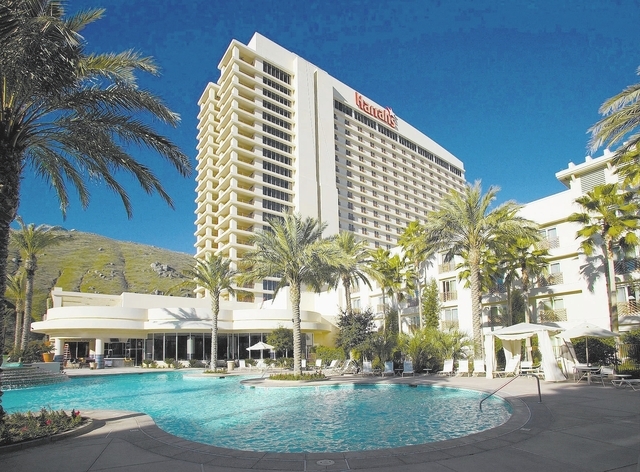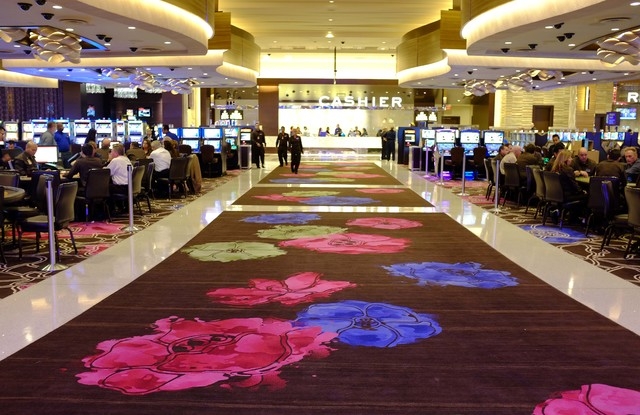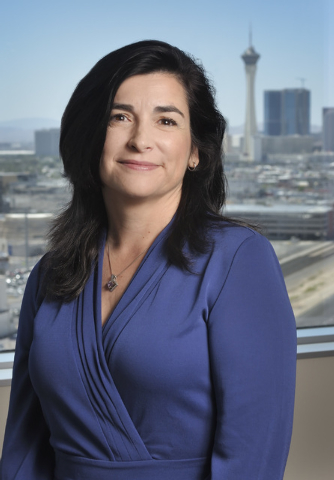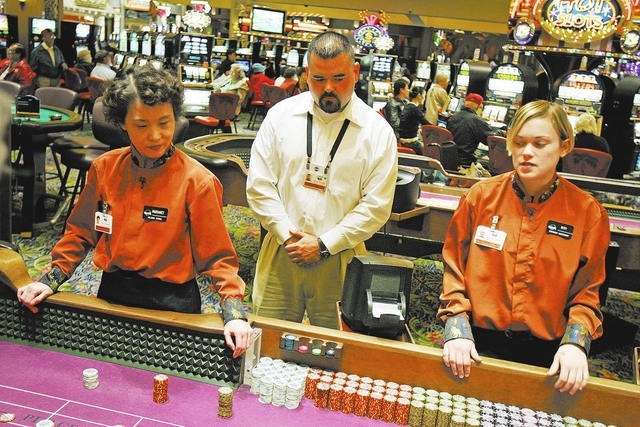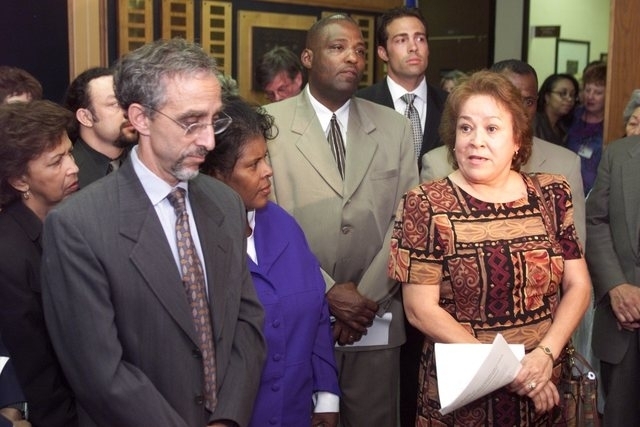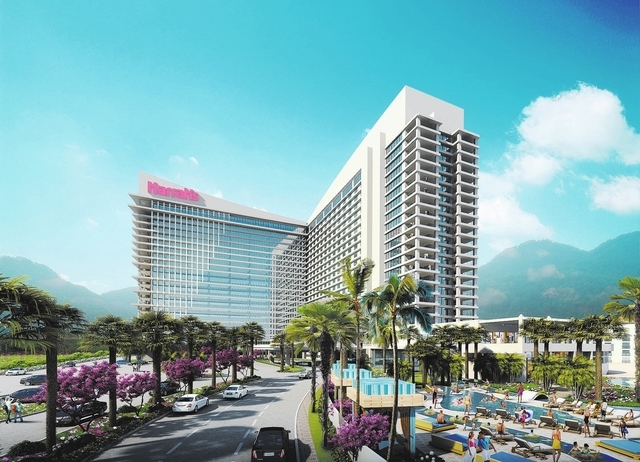Gaming companies have lucrative deals operating Indian casinos
New casino development in Las Vegas is on lockdown.
Gaming expansion into states beyond recently approved markets is virtually nonexistent.
Those are two reasons regional casino giant and M Resort owner Penn National Gaming struck a deal with a San Diego-area Indian tribe to develop a long-stalled casino complex in Southern California.
A third reason is simple.
Penn National, which has 29 casinos nationwide, views the planned $360 million Hollywood Casino Jamul as an opportunity to increase its customer base in an untapped market. The development is 20 miles east of downtown San Diego, California’s second-largest city and the eighth-most populous city the U.S.
“We love the location and it’s a new way for us to cultivate a whole new set of customers,” Penn National Chief Operating Officer Jay Snowden said of the property, which is being built in partnership with the Jamul Village Indian Tribe.
In addition to the 390-room M Resort, Penn’s other Western casino is the Zia Park Racetrack in New Mexico.
“We’re eager for any opportunities to grow the company,” Snowden said.
The idea of the commercial casino industry striking management deals with Indian tribes isn’t new.
Station Casinos manages two Indian casinos — one each in California and Michigan — and has a deal for another Indian gaming project in central California. The company helped build and operate one of Northern California’s largest Indian casinos from 2003 to 2010 when the management contract expired.
Caesars Entertainment Corp. operates Indian casinos in California, Arizona and North Carolina.
“We’re very happy with the three partnerships we have cultivated,” Caesars Central Division President John Payne said. “The customers have been a great addition to our network. The facilities have developed into tourist destinations, not just pure casinos.”
Payne said customer activity at the Harrah’s-branded casinos near San Diego, outside Phoenix and in northern North Carolina are recorded within the company’s Total Rewards program. The locations allow Caesars to market the company’s properties in destination markets, such as Las Vegas and Atlantic City.
“Some of these partnerships are decades old,” Payne said. “We’ve worked hard to further those relationships.”
BIG BUSINESS
Indian gaming is far from penny ante.
In 2011, Indian casinos nationwide produced $27.4 billion in gaming revenue, according to Casino City’s 2013 Indian Gaming Industry Report. With 460 tribal casinos in 28 states, it takes more than a year for a California economist to compile the statistics.
California, which had 68 tribal casinos in 2011, is the nation’s largest Indian gaming market, producing more than $6.91 billion in gaming revenue in 2011 — accounting for more than 25 percent of the nation’s total.
Those figures caught the eye of the commercial casino industry.
Las Vegas hasn’t seen a resort open since 2010. Redevelopment projects, such as the SLS Las Vegas and Bill’s Gamblin’ Hall, will reopen shuttered facilities. Construction of the $2 billion Resorts World Las Vegas — on the former Stardust-Echelon site — is expected to begin sometime this year and take more than two years to complete.
Nationally, Massachusetts was the last all-new market to approve casinos in 2011. There has been discussion of gaming expansion into other states, but nothing has come to fruition.
Indian gaming can be another growth market, along with riverboats and racetracks.
“We view Indian gaming in the same manner as we look at other development pipelines,” Snowden said.
Jamul will be Penn’s first casino for an American Indian tribe. The company has operated Casino Rama in Ontario on reservation land for the Chippewas of Rama First Nation since 1996.
Victor Rocha, editor of Pechanga.net, said small tribes often see their project come to fruition quicker with the help of a traditional commercial casino corporation.
“A lot of tribes are more aggressive to get something done,” Rocha said. “Anything that’s a big risk can also have big rewards.”
The Jamul tribe first signed its compact with California in 1999, but the size of the casino site was reduced dramatically by changes in federal law.
“It’s not much more than a postage stamp,” Rocha said of the 6-acre parcel.
Rocha added that partnering with a company the size of Penn, which can develop a Hollywood casino brand to fit the location, makes better financial sense for a tribe, rather than attempt the project alone.
Las Vegas gaming attorney Jennifer Carleton of Brownstein Hyatt Farber Schreck spent 10 years as in-house counsel for a Wisconsin Indian casino. Since moving to Las Vegas, she has found herself increasingly advising the firm’s gaming clients on Indian gaming law.
The tribes benefit from major casino companies that have investment banking and financial connections to provide the development funds. The tribes also gain a partner with a large database of customers and the expertise to manage the casino.
“There are not as many potential developments as there were 10 years ago,” Carleton said. “For the tribes, a third party can often provide access to other areas, such as the technology for social media and online capabilities.”
The drawback with tribal gaming, however, is that development often takes place at a slower pace than with traditional commercial casino development. Approvals are needed from state and local governments, and federal agencies.
A 2009 U.S. Supreme Court ruling changed the way tribes were federally recognized. The primary switch was that the federal government could no longer take land into trust from tribes that were recognized after 1934, which slowed casino development possibilities.
“Navigating the land issues can be expensive and politically charged for the tribe,” Carleton said.
NO NEW PROJECTS
Payne said Caesars isn’t actively looking for new tribal projects, but is focused on expanding and developing its current partnerships.
Harrah’s Rincon in northern San Diego County with the Rincon Band of Luiseno Indians has 662 hotel rooms and a 55,000-square-foot casino. Harrah’s Ak Chin, located in southern Phoenix for Ak Chin Indian Community, has 300 hotel rooms and a 40,000-square-foot casino. Both properties have other entertainment amenities, such dining and spa facilities, that add to the destination resort complex.
In North Carolina, Harrah’s and the Eastern Band of Cherokee Indians announced plans last year for a second resort that will have a 300-room hotel and 60,000 square feet of gaming space. The property will be in Murphy, N.C., 60 miles west of the original Harrah’s Cherokee, which has 1,200 rooms and a 90,000-square-foot casino. The resort is considered the state’s largest hotel.
“We’re not pursuing any new Indian developments at this time, but that doesn’t mean it won’t happen,” Payne said.
Station Casinos operates the Gun Lake Casino near Grand Rapids, Mich., for the Gun Lake Tribe of Pottawatomi Indians and the $800 million Graton Resort & Casino, which opened in November near Santa Rosa, Calif., for the Federated Indians of Graton Rancheria Tribe.
Station Casinos had one of the gaming industry’s first development deals with a California Indian tribe when the company opened Thunder Valley near Sacramento, Calif., for the United Auburn Tribe in 2003.
Last year, California Gov. Jerry Brown signed a bill that allows the North Fork Rancheria of Mono Indians to move forward with the planned $350 million project with Station Casinos near a major state highway and Madera, Calif., about 25 miles north of Fresno.
However, an opposition group — which is financially backed by two competing Indian tribes — qualified a statewide ballot referendum for California’s November election that could kill the project.
Contact reporter Howard Stutz at hstutz@reviewjournal.com or 702-477-3871. Follow @howardstutz on Twitter.
NEVADA CASINO COMPANIES AND INDIAN GAMING
Station Casinos
▶ Thunder Valley (California) 2003-10
▶ Gun Lake (Michigan)
▶ Graton (California)
▶ North Fork (California) — in development
Caesars Entertainment Corp.
▶ Harrah’s Rincon (California)
▶ Harrah’s Ak Chin (Arizona)
▶ Harrah’s Cherokee (North Carolina)
▶ Harrah’s Cherokee II (North Carolina) — in development
Penn National Gaming
▶ Hollywood Casino Jamul (California) — in development
▶ Casino Rama (Ontario)
Full House Resorts
▶ Buffalo Thunder Casino (New Mexico)



